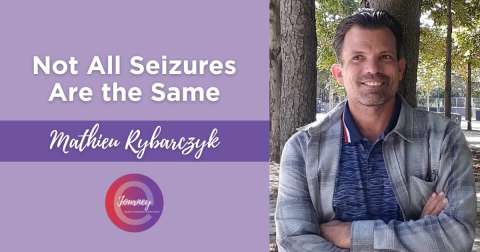Not All Seizures Are the Same

By Mathieu Rybarczyk , Florida
Person with EpilepsyThursday, September 7, 2023
I was born a normal baby boy in Maracaibo, Venezuela, in 1977. Things were simple, and I had no medical problems for the first few years. Then, meningitis hit me at the age of 3. I fell into a coma for two weeks. I lost a lot of blood, and my life hung in the balance briefly. Docotors worked to save me, and when I came out of it all, I was blind, deaf, mute, and paralyzed from the waist down. By the time I was 4, I had my first seizure.
My sight, speech, and hearing returned little by little each year. It took the longest for me to regain mobility. It was a lot to deal with in my young life. I was born right-handed but had to go through therapy and learn everything from scratch again, so I became left-handed.
Throughout my childhood and adolescence, I was bullied. I became known as the "shaking kid" due to my tonic-clonic seizures at school. Feeling embarrassed, though, was the worst part. The bullying continued, and by young adulthood, I wanted to end my own life. However, with the support of friends and family, I worked through my anger, anxiety, and suicidal thoughts. The two things that helped the most were my girlfriend, now my wife, and comedy.
Healing takes time, and accepting my situation has been a challenge. Today, partially with the help of medication, the tonic-clonic seizures are gone. The seizures I have now are considered emotional seizures that happen when I experience anger, stress, nervousness, or excitement. We all have unique ways to manage or avoid seizure triggers, and it's important that you try to find what works for you. For me, it is focusing on something positive to help keep my emotions stable. I listen to soft, soothing classical music and do hypnosis-guided nature walks in the evening at bedtime. My favorite hobby is photography.
A lot of people don't understand what epilepsy is. They may know what a seizure is, but they don't understand there are many types of seizures, and not all lead to shaking and falling. Other people think, "So you had a seizure, and now you are fine." In reality, there is so much more to it, which is what I want people who read my story to understand.
The Epilepsy Foundation's 24/7 Helpline staff is trained to help people having thoughts of suicide. You can also talk to a healthcare professional or call or text 988 for the Suicide & Crisis Lifeline.
Reviewed By: Sara Wyen
